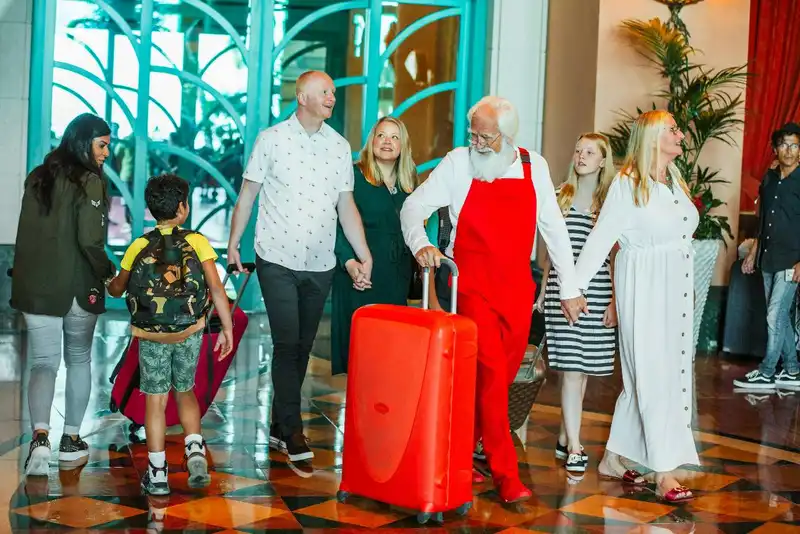How do niche platforms contribute to hiring in the hospitality sector?
Niche platforms play a vital role in hospitality hiring by catering to specific industry segments. These platforms focus on unique aspects like culinary arts, hotel management, or event planning, connecting employers with candidates possessing specialized skills. The targeted nature of niche platforms streamlines the hiring process, ensuring that businesses find candidates with precise qualifications and expertise relevant to their specific hospitality needs.
Innovative Recruitment Strategies in Hospitality Careers
The Hospitality Recruitment Landscape
The quest for top-tier talent has become a strategic imperative for restaurant owners and executives. As the industry continues to evolve, the importance of strategic recruitment cannot be overstated, serving as the basis for building high-performing teams in this diverse sector.
The current state of the hospitality job market, marked by demand-supply dissonance, highlights the pressing need for skilled and dedicated professionals in various sectors such as hotels, restaurants, event management, and more. The multifaceted nature of jobs in hospitality necessitates a nuanced approach to recruitment. With customer expectations soaring and competition intensifying, the significance of assembling a team that not only meets but exceeds these expectations for jobs in hospitality is unquestioned.
In the pursuit of assembling such high-performing teams, restaurant owners and executives grapple with a myriad of challenges. One of the foremost issues is the ever-increasing competition for skilled personnel. The scarcity of top-tier talent in the market has transformed recruitment into a competitive sport, compelling employers to adopt innovative and enticing strategies to attract candidates.
Moreover, the hospitality sector's unique demands, characterized by long hours and a fast-paced environment, present an additional hurdle. Recruiting professionals who not only possess the requisite skills but also thrive in this dynamic setting poses a constant challenge. Executives find themselves navigating the delicate balance between attracting talent and ensuring candidates align with the industry's demanding nature.
Cultural fit also emerges as a critical consideration. The hospitality sector's diversity, with establishments ranging from boutique hotels to bustling restaurants, necessitates a keen eye for candidates who can seamlessly integrate into varied work cultures. Crafting recruitment strategies that evaluate cultural compatibility alongside skills becomes imperative for sustained success.
Despite these challenges, the hospitality industry stands at the threshold of immense opportunity. Strategic recruitment, tailored to the specific needs and nuances of the sector, holds the key to unlocking this potential. By understanding the unique demands, embracing innovation in talent acquisition, and prioritizing cultural alignment, restaurant owners and executives can not only weather the challenges of the current job market but also build resilient and high-performing teams that elevate the industry to new heights.
Understanding the Unique Positions

The hiring process is complex and goes beyond the mere exchange of resumes. The distinct roles within hotels, restaurants, and event management demand a nuanced understanding of the varied skill sets essential for success in hotel careers. Effectively navigating the recruitment process necessitates a strategic approach that acknowledges the unique demands of front-of-house (FOH) and back-of-house (BOH) positions.
Front-of-House Positions
The face of the establishment requires a set of skills that go beyond the conventional. Hospitality industry executives recognize the paramount importance of interpersonal skills, effective communication, and a polished demeanor in individuals occupying roles such as receptionists, servers, and front desk staff. The ability to engage with guests seamlessly and anticipate their needs is non-negotiable. Executives keen on building an unparalleled guest experience understand the significance of hiring individuals who embody the essence of hospitality in every interaction.
The Back-of-House Positions
Often, operating behind the scenes demands a different set of competencies. Culinary roles, for instance, necessitate culinary expertise, precision, and creativity. Kitchen staff, chefs, and other BOH professionals are the architects of gastronomic delights, requiring a keen eye for detail, adaptability, and adeptness in navigating the busy kitchen environment. Hiring managers targeting these roles recognize that the success of the culinary team is rooted in the mastery of the craft and a commitment to excellence.
To optimize recruitment efforts, hospitality industry executives must tailor their strategies to the specific requirements of each position. For FOH roles, emphasis should be placed on assessing candidates for their interpersonal finesse, adaptability in high-pressure situations, and a genuine passion for guest satisfaction. On the other hand, for BOH positions, executives should prioritize technical skills, creativity, and the ability to collaborate seamlessly within a team.
Moreover, recognizing the cross-functional nature of the industry, executives must appreciate the symbiotic relationship between FOH and BOH. Effective collaboration between these two facets is imperative for delivering a cohesive and exceptional guest experience. Successful recruitment strategies, therefore, extend beyond individual role requirements to encompass the broader goal of fostering synergy among the diverse talents within the establishment.
The trick to successful hiring in the hospitality industry lies in acknowledging the nuanced skill sets demanded by front-of-house and back-of-house positions. Executives committed to elevating their establishments must craft targeted recruitment strategies that align with the specific demands of each role, fostering a workforce that collectively contributes to the seamless orchestration of unparalleled guest experiences.
Innovative Restaurant Software Solutions
Modernize Your Recruitment Process with Altametrics
Popular Job Boards for Hospitality Careers
Several widely used platforms stand out as key players in the hospitality industry's talent acquisition. These platforms, each with its own distinct advantages and limitations, cater to the diverse needs of executives in the hospitality industry.
1. A platform may excel at casting a broad net, attracting a diverse pool of candidates. The user-friendly interface facilitates straightforward job posting, ensuring a large influx of applicants. However, the sheer volume of responses poses a challenge for executives, requiring efficient filters to identify the most suitable candidates efficiently.
2. The platform can adopt a unique approach, combining job listings with company reviews and insights. This approach provides candidates with a holistic view of potential employers, allowing them to consider not only job opportunities but also company culture. For executives, this transparency is advantageous, but the platform's emphasis on company reviews may occasionally overshadow the job listings.
3. A platform, as a professional networking giant, focuses on the strength of professional profiles. This platform enables executives to conduct targeted searches based on specific skills and experience, and it provides the ability to connect with both active and passive candidates. However, the availability of premium features may pose a challenge for smaller establishments with budget constraints.
Despite their strengths, each platform has limitations. The platform's broad reach may face a signal-to-noise challenge, necessitating effective filters. The platform emphasizing company reviews demands meticulous reputation management to attract top talent. The professional networking platform may be perceived as a barrier to entry for smaller players due to its premium features.
In terms of the types of candidates found on these platforms, the platform with broad reach tends to attract a diverse range of candidates, from entry-level to seasoned professionals. The platform combining job listings with company reviews often appeals to mid-career professionals seeking a deeper understanding of company culture. The professional networking platform consistently hosts a mix of active and passive candidates, including industry veterans and executives.
These online platforms collectively offer a comprehensive approach to hospitality recruitment. Executives are advised to strategically leverage the strengths of each platform while navigating their respective limitations. The challenge is to strike a balance in the recruitment process that ensures both quantity and quality, thereby creating a healthy ecosystem for talent acquisition in the rapidly expanding hospitality industry.
Specialized Platforms Catering to Professionals
Specialized job boards such as HCareers, CatererGlobal, and Hotel Jobs have proven to be critical tools dedicated to connecting professionals with the right opportunities. These platforms uniquely focus on catering to the specific needs of the hospitality sector, facilitating the recruitment of individuals with specialized skills and experiences crucial for success in the field.
HCareers stands out as a beacon for hospitality professionals seeking career advancement. With a comprehensive range of listings spanning hotels, restaurants, and other related establishments, HCareers serves as a centralized hub for those keen on pursuing diverse roles within the industry. The platform meticulously curates opportunities, ensuring that candidates with niche skill sets find positions that align with their expertise.
CatererGlobal, on the other hand, takes a global approach, acknowledging the international nature of the hospitality sector. This platform is tailored for professionals seeking roles beyond borders, providing a gateway for talent to explore opportunities in diverse cultural and geographical settings. CatererGlobal's commitment to facilitating cross-border placements attracts hospitality executives with a global mindset, fostering a rich exchange of skills and perspectives.
Hotel Jobs, as the name suggests, hones in on opportunities within the realm of hotels. Specialization is the key to its success, allowing professionals to navigate a plethora of positions ranging from front-of-house to back-of-house operations. The platform serves as an industry-specific compass, guiding candidates towards roles that match their competencies, be it in hotel management, guest services, or culinary arts.
These platforms strategically appeal to candidates by offering user-friendly interfaces and intuitive search functionalities. Professionals can efficiently filter through listings based on parameters such as location, job level, specialization, and even specific fields like food careers, streamlining the job search process. This targeted approach not only saves time for industry executives but also ensures that candidates are presented with opportunities that closely align with their career aspirations.
Moreover, these platforms recognize the evolving nature of the hospitality sector and its demand for specialized skills. By featuring industry-specific certifications, training programs, and networking events, they go beyond traditional job listings. This approach not only attracts seasoned professionals but also fosters a community of continuous learners, contributing to the industry's overall growth and adaptability.
HCareers, CatererGlobal, and Hotel Jobs play instrumental roles in the success of the hospitality sector by serving as dedicated platforms that connect industry executives with the right talent. Their focus on specialization, user-friendly interfaces, and support for continuous learning make them indispensable tools for professionals navigating the environment of hospitality.
Niche Platforms for Specific Roles

To streamline recruitment efforts and ensure a tailored approach, industry executives are increasingly turning to niche platforms that cater specifically to their unique needs. These platforms, designed to connect employers with candidates possessing specialized expertise, offer a range of benefits that contribute to the overall efficiency of the hiring process.
For culinary maestros seeking the perfect chef to helm their kitchen, culinary job boards have become indispensable. These platforms go beyond generic job search engines, allowing hospitality executives to focus on candidates with a proven track record in the culinary arts. Whether it's a fine-dining establishment or a bustling cafe, these platforms provide a pool of talent that understands the nuances of the culinary world, ensuring that the heart of the establishment beats with culinary excellence.
Event management, another critical facet of the hospitality industry, requires a specific skill set and a keen eye for detail. Executives in search of seasoned event managers are finding solace in platforms tailored to event management positions. These platforms curate a collection of professionals adept at orchestrating seamless events, from intimate gatherings to grand galas. The result is a recruitment process that aligns effortlessly with the demands of the hospitality industry, where flawless execution is of the utmost importance.
The benefits of utilizing such niche platforms are manifold. Firstly, they save time by presenting a pool of candidates already equipped with the industry-specific skills required for success. This targeted approach eliminates the need for sifting through irrelevant applications, allowing hospitality executives to focus their energy on selecting the best fit for their unique requirements.
Secondly, these platforms foster a sense of community within the industry. By bringing together professionals with shared expertise, they create a space where the exchange of ideas and insights becomes intrinsic to the recruitment process. This not only ensures a smoother hiring experience but also contributes to the overall growth and innovation within the hospitality sector.
As the hospitality industry continues to grow, the importance of niche platforms for specific roles cannot be overstated. Culinary job boards for chefs and platforms dedicated to event management positions are invaluable tools for industry executives, offering a targeted, efficient, and community-driven approach to recruitment. Embracing these platforms is a commitment to elevating the standards of talent acquisition in the rapidly changing world of hospitality, particularly when considering careers in food industry.
Leveraging Social Media
The importance of social media platforms, especially LinkedIn and Twitter, in developing a strong online presence cannot be overstated. These platforms serve as invaluable tools for executives and professionals seeking to forge connections and identify potential candidates in the vast talent pool.
LinkedIn
Often dubbed the professional networking hub, it stands as a virtual showcase of expertise and accomplishments within the hospitality sector. Executives can strategically leverage their profiles to highlight key achievements, skills, and industry contributions. Regularly updating the LinkedIn feed with relevant content, such as insights into industry trends, success stories, and thought leadership pieces, ensures a consistent and engaging presence. Embracing multimedia, such as videos or infographics, adds vibrancy to the content mix, making the profile visually appealing and informative.
Twitter
Twitter, with its fast-paced and concise nature, complements LinkedIn by providing a platform for real-time interactions and the sharing of bite-sized insights. Executives can actively participate in industry-related conversations, share quick updates, and amplify their presence through the strategic use of hashtags. Engaging with trending topics in the hospitality sphere not only fosters visibility but also positions executives as active contributors to the ongoing dialogue in the community.
Creating compelling content is the most important thing. Executives can share success stories, highlight innovative projects, and provide practical tips that showcase their expertise. Utilizing visuals, such as high-quality images or infographics, enhances the appeal of the content and captures the audience's attention in the fast-scrolling world of social media.
Networking within the hospitality community on these platforms involves proactive engagement. Executives, including those pursuing careers in culinary arts, can join relevant LinkedIn groups and Twitter conversations, participate in discussions, and share insights. This not only expands their network but also establishes them as approachable industry leaders.
In the hospitality realm, authenticity resonates. Executives should infuse their social media presence with a genuine passion for the industry. Sharing personal experiences, acknowledging challenges, and celebrating successes fosters a connection with the audience.
The strategic use of LinkedIn and Twitter emerges as a potent tool for hospitality executives to shape a compelling online identity and foster meaningful connections within the industry. By curating engaging content and actively participating in the digital discourse, executives can navigate the social media landscape to propel their professional journey and contribute to the vibrant tapestry of the hospitality community.
Recruitment Agencies in the Hospitality Sector
Local recruitment agencies, deeply rooted in the regional hospitality landscape, offer a nuanced understanding of the unique challenges and opportunities specific to a particular area. Their proximity enables them to cultivate a rich network of candidates with a profound understanding of local culture, preferences, and customer expectations. This local expertise proves invaluable when sourcing talent that seamlessly integrates into the fabric of a community, enhancing the overall guest experience.
On the other hand, global recruitment agencies bring a broader perspective to the table. Their expansive reach transcends geographical boundaries, allowing them to tap into a diverse pool of candidates with varied cultural backgrounds and international experience. This global outlook is particularly advantageous for restaurant owners and executives aiming to infuse their establishments with a cosmopolitan flair, catering to an increasingly diverse clientele.
Both local and global agencies excel at identifying candidates with the specific skill sets demanded by the hospitality industry. Local agencies leverage their grassroots connections to source candidates well-versed in regional cuisines, local regulations, and customer expectations. In contrast, global agencies cast a wider net, ensuring access to a diverse talent pool encompassing chefs, managers, and staff with global exposure and a wealth of industry knowledge.
Furthermore, these agencies employ rigorous screening processes, meticulously assessing candidates' qualifications, experience, and cultural fit. This meticulous approach significantly reduces the time and resources spent on sifting through resumes, allowing restaurant owners and executives to focus on what they do bestrunning their establishments.
Whether opting for the localized insight of a regional agency or the global perspective of an international counterpart, hospitality industry executives can leverage the advantages offered by recruitment agencies. Local agencies bring an intimate understanding of the community, while global agencies offer a broader spectrum of talent. Regardless of the choice, the collaboration with these specialized agencies streamlines the recruitment process, ensuring that the hospitality sector continues to thrive with skilled and culturally attuned professionals at its forefront.
Building Long-Term Talent Strategies
The imperative for long-term success in the hospitality industry lies not only in current operational excellence but also in the foresight to cultivate a robust long-term talent strategy. Forward-thinking executives recognize that the longevity of their enterprises hinges on the cultivation and retention of skilled professionals who can adapt to evolving trends and guest expectations.
Networking stands tall as a linchpin in fortifying this strategic approach. The symbiotic relationships forged within the industry yield a treasure trove of insights, best practices, and potential collaborations. Executives who actively engage in networking, whether through industry conferences or collaborative forums, position their organizations at the forefront of industry advancements. It's a strategic move that transcends immediate gains, creating a network effect that pays dividends in the form of shared knowledge and collaborative opportunities.
Equally valuable is the act of attending industry events. These gatherings serve as crucibles for innovation, providing a firsthand look at emerging technologies, market trends, and transformative strategies. Hospitality leaders who leverage these opportunities not only stay abreast of industry developments but also gain a competitive edge by integrating cutting-edge practices into their operations.
Fostering relationships with educational institutions emerges as another cornerstone in the foundation of a forward-looking talent strategy. Establishing partnerships with schools specializing in hospitality management ensures a continuous pipeline of qualified candidates. Such collaboration allows organizations to actively influence the development of curricula, ensuring that graduates possess the skills and knowledge relevant to the industry's evolving needs. Beyond recruitment, these partnerships create a symbiotic relationship that fosters a culture of lifelong learning and adaptability among the workforce.
Managing a successful business encompasses more than just career management; it involves maintaining a positive image and catering to your clientele effectively. Employer relations, employee training, and time management play pivotal roles in achieving success. This is where Altametrics excels.
Altametrics, a software company, specializes in providing cutting-edge solutions tailored specifically for the hospitality and restaurant industries. The objective is to enhance overall operations and elevate the customer experience. Through Altametrics' comprehensive software suite, encompassing inventory management, labor scheduling, and performance analytics, restaurants can leverage data-driven insights to make well-informed decisions and improve operational efficiency.
In the grand world of hospitality, a proactive approach to talent strategy is the thread that weaves success over time. Networking, industry events, and educational partnerships represent not merely tactical initiatives but strategic imperatives for executives aiming to navigate the ever-changing currents of the hospitality landscape. By embracing these practices, hospitality industry leaders lay the groundwork for a resilient and dynamic workforce, laying the groundwork for long-term success in an industry where excellence is the currency of longevity.












